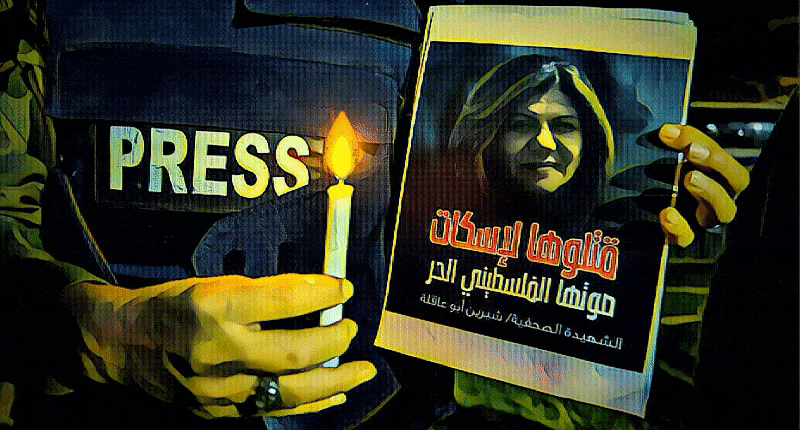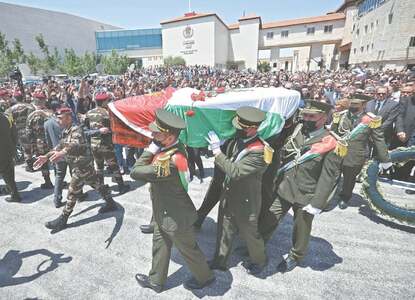Killing the truth: Shireen Abu Akleh's murder is a reminder that Israel will go to any length to silence its critics
A wave of anger and sadness, accompanied by shock and a refusal to accept that legendary Palestinian journalist Shireen Abu Akleh has gone, has since permeated the Palestinian territories and spilled beyond its borders. Shireen was gunned down by Israeli sniper fire — although Israel has so far denied it — while covering its latest incursion into the city of Jenin in the occupied West Bank, a territory under Israeli control.
The 51-year-old veteran journalist was shot in the head and left bleeding before she was finally transferred to the hospital. Evacuating her from the scene under continuous Israeli fire was dangerous and difficult, but a brave Palestinian man managed to drag her body out of the line of fire after some time. She was pronounced dead on arrival at the hospital. Another Palestinian journalist, Ali Sammoudi, was also injured by Israeli sniper fire at the scene.
"We were wearing a helmet and 'PRESS' vest and clearly looked like journalists," said journalist Shatha Hanaysheh, who was at the scene with Shireen and two other journalists, including Sammoudi. "Shireen is a well-known, veteran journalist, even to the Israeli soldiers," Shatha continued.
“We were deliberately standing in an area where the soldiers could see we were wearing press uniforms,” Shatha recalled. “The shooting started after we reached a place that became difficult to withdraw from. If the aim was not to kill, they would have shot before we reached a narrow, besieged place from which it is difficult to withdraw. What happened is an obvious targeting of us as journalists.”
Though this is not the first time that journalists have been targeted or even killed by Israeli forces, the outrage and outpour of grief for Shireen and what she stood for has reverberated across parts of the world.
A household name
Shireen Abu Akleh was born in 1971 in the occupied city of Jerusalem. She held a bachelor's degree in journalism and media from Yarmouk University in Jordan. Over the past 20 years, she had become a familiar face in Palestinian households as she documented Israel's human rights violations and repeated incursions into occupied territories. Since 1997, she was affiliated with the Al Jazeera network and had covered the Gaza wars of 2008, 2009, 2012, 2014 and 2021.
In one of her recent news broadcasts for Al-Jazeera, Shireen had said that she was under threat of being killed and had miraculously survived several attempts on her life. More importantly and unfortunately for Israel, Shireen was an American citizen and the US — Israel's biggest donor and supporter — has demanded a "thorough investigation" and for those responsible to be held accountable.
Israel's lies
In response to the global outcry, the Israeli Defence Force's Chief of Staff Aviv Kohavi said: "It is not possible to determine the direction of the fire that targeted Shireen Abu Akleh; we have appointed a special team to investigate." His comments came a little after Israeli government and pro-military accounts released video footage of armed Palestinian fighters, who they claimed were in the area when Shireen was killed.
Meanwhile, the Israeli newspaper Haaretz quoted the Israeli army's investigation, stating Shireen was 150 meters away when the elite Israeli Duvdevan unit fired dozens of bullets toward the area where Shireen and other journalists were standing. The newspaper added that the bullet that hit Shireen was of 5.56 mm calibre, fired from an M16 rifle.
The Israeli human rights centre B'Tselem's investigation into the killing also found contradictions between the Israeli army's narrative and that of other witnesses. Crucially, the investigation found that the fighters in the video released by the Israeli authorities were several turns away from where Shireen was shot.
But the occupation authorities weren't sated even after killing Shireen. Hours after her murder, Itamar Ben Gvir, the extremist Israeli MP, called on the soldiers to shoot with full force, even if there were journalists from Al-Jazeera.

The Israeli forces seemed to have taken his words to heart, storming her funeral on Friday in the Church in Beit Hanina — north of occupied Jerusalem — and demanding the removal of Palestinian flags. Occupation authorities then summoned her brother, Tony Abu Akleh, for an investigation and ordered him to take down the flag as well. Palestinians waiting in the courtyard of Farnsawy Hospital, where Shireen’s body was held for a brief time, were assaulted by Israeli forces.
Déjà vu?
Shireen's murder and the events in its aftermath are clear evidence of the relentless brutality of Israeli occupation forces, according to the Palestinian Journalists Syndicate (PJS). Ironically, it coincided with the first anniversary of the murder of colleague Youssef Abu Hussein — killed in an Israeli air raid that struck his house in the besieged Gaza Strip — the destruction of more than 40 media institutions, and the bombing of Al-Jalaa Tower, which housed several media networks, including the Al-Jazeera headquarters in Gaza, and the Associated Press agency — all part of the brutal 11-day Israeli bombing campaign on Gaza last May.
Israel has a long, well-documented history of violating press freedoms as well as killing, injuring or arbitrarily detaining journalists. Shireen is not the first and won't be the last victim to be executed by the Israeli occupation army.
Between 2000 and 2020, the occupation army killed 46 Palestinian journalists on the job, according to the PJS. This tally doesn't even include foreign journalists who have been killed by IDF personnel — most famously, the cold-blooded murder of British award-winning documentary filmmaker James Miller, who was shot dead in Gaza even after identifying himself as a journalist.
Reporters Without Borders — a non-profit organisation focused on media freedom — has documented injuries caused to more than 144 Palestinian journalists by Israeli soldiers or police over just the last four years, including 10 who have been left permanently disabled due to loss of limbs. There are currently 16 Palestinian journalists held behind bars according to the Palestinian Prisoners Club, including Bushra al-Tawil, jailed without charge or trial under administrative detention. She is currently being detained for her posts on social media, and has previously served six terms under Israeli administrative detention. Mahmoud Issa, another Palestinian journalist, has been in Israeli jails since 1993.
Meanwhile, the Palestinian Center for Development and Media Freedoms (MADA) documented more than 368 violations by Israeli forces in the last year alone, including 155 direct violations in the form of injuries and killings. Three journalists were killed during the 2021 aggression on the Gaza Strip: Muhammad Shaheen, Abdul Hamid Al-Kolak, and Youssef Muhammad Abu Hussein.
In Palestine and the occupied Israeli territories, journalists’ equipment is seen as a threat. In fact, hours after Shireen's murder, Israeli military spokesperson Ran Kochav described her as “filming and working for a media outlet amidst armed Palestinians. They’re armed with cameras, if you’ll permit me to say so.”
In most cases, the Israeli occupation soldiers do not hesitate to break or confiscate cameras to erase the racist and inhumane violations they have documented. Palestinian photo journalist Basel al-Adra recounted how his house was raided by Israeli soldiers and his equipment, including computer hardware and cameras, were stolen in December.
Journalists in the Gaza Strip are also prevented from accessing modern cameras as the Israeli government controls the crossings and prevents the shipment of certain technology into Gaza.
The truth will prevail
Since the announcement of Shireen’s murder, several social media campaigns have been announced, with people from across the globe condemning the crime and showing their love for Shireen. Celebrities and officials have also spoken out, using social media to express outrage and solidarity.
American Congresswoman Ilhan Omar, in a tweet, denounced the killing and called upon Israel to be held accountable for human rights violations. Other US lawmakers, including US House of Reps Speaker Nancy Pelosi and Bernie Sanders, have joined in. Rallies and sit-ins have been organised in the Gaza Strip and the West Bank, as well as around the world, calling for a stop to Israeli crimes.
As journalists, the killing of Shireen has triggered us all and served as a reminder that no Palestinian is safe — everyone is a target.
It reminds me of how my colleagues and I have escaped the clutches of certain death so many times, from multiple Israeli airstrikes or when we were covering the massive peaceful marches along the separation fence with Israel. At least three of my colleagues were killed and dozens injured — some lost their eyes, others became permanently disabled while covering Gaza's series of Great March of Return in 2018 and 2019.
What we have witnessed and experienced first hand has made it abundantly clear that these tactics were meant to scare us away from the field, because we are the only ones who can expose their ugly acts of oppression. Even when we use social media platforms, they censor our journalism and disable our accounts. I have personally lost several accounts for no reason other than reporting what is happening on the ground.
Yet these acts of oppression do not deter us. They only increase our determination to carry on with our work and tell the truth to the world, come what may. For Shireen. For Youssef. For the millions of Palestinians living in the world's largest prison and facing the worst human rights violations by Israeli occupation forces every single day.
Header image: Adapted from Anas-Mohammed/ Shutterstock.com







